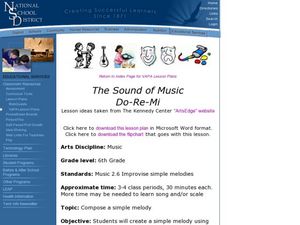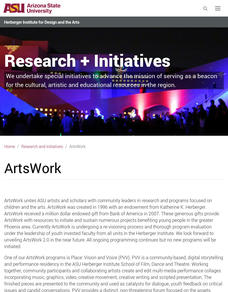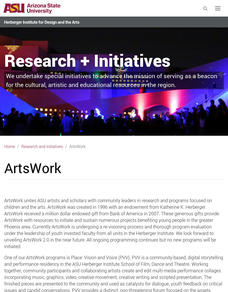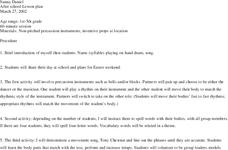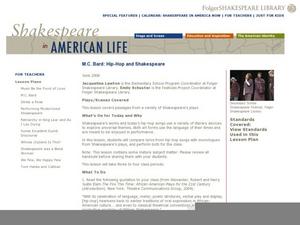Curated OER
Oedipus Wrecks
Students explore the concept of the 'tragic hero' and how such characters are relevant in theatre, literature, and history.
Curated OER
Dust Bowl Depression
Students examine the Dust Bowl and the impact it made on farm families. In this U. S. history lesson, students role play a writer searching for a family that moved during the Great Depression. Students uncover what prompted families to...
Curated OER
The Sound of Music: Do-Re-Mi
Seventh graders create a simple melody using the Solfedge syllables. In this melody lesson, 7th graders watch the movie The Sound of Music and focus on the "Do Re Mi" clip. Students examine solfege syllables and create a melody...
Curated OER
Creating Stage Designs that Reflect
Students identify and research cultural, historical, and symbolic clues in dramatic texts. They demonstrate knowledge of research sources.
Curated OER
Creating Plays from Children's Stories
Students explain how individual elements (e.g., plot, theme, character, conflict, etc.) comprise the structure of a play. They write an original one-act play with developed characters, specific setting, conflict, and resolution.
Curated OER
Understanding Stage Design: Using Visual Elements to Provide Information to an Audience
Middle schoolers study about theatrical design by developing environments for improvised and scripted scenes. They develop focused ideas for an environment using visual elements.
Curated OER
MACBETH and the Themes of Ambition,
Students describe and compare characters and situations in dramas from and about cultures and historical periods, illustrate in improvised or scripted scenes, and discuss how theater reflects a culture.
Curated OER
Creating and Using a Checklist of Performance Techniques to Critique and Find the "Message" in Mass Media Performances
Students analyze and critique theater events by evaluating and constructing meanings from improvised and scripted scenes and from theater, film, television, and electronic media productions.
Curated OER
Dramatizing Your Story
Learners write a script, planning and recording improvisations based on personal experience and heritage, imagination, literature and history.
Curated OER
Putting the Sitcom into Perspective
Students identify and compare similar characters and situations in stories and dramas from and about various cultures, illustrate with classroom dramatizations, and discuss how theater reflects life.
Curated OER
Storytelling Model
Students examine how to model story telling for their classes. They investigate how to learn, rehearse and share stories.
Curated OER
Semiotics and Set: Year 9
Drama enthusiasts explore the importance of set and action in conveying dramatic tension. They act out a polished dramatic piece using the set as a key component of their story. This should be connected to setting as it is also used in...
Curated OER
Movement
Young scholars experiment and explore a variety of instruments and movements. They play rhythms on instruments, spell words using their bodies, act out the movements of a song, role-play machine parts as a group, pantomime an activity,...
Curated OER
On Thinning Ice: An eco-theatre production about climate change
Students investigate the causes and possible consequences of climate change in the north, and realize their choices and actions can help reduce climate change. Some of the skills involved in the lesson plan are discussion, synthesis,...
Curated OER
Comedia dell' Arte Paper Masks
Students create masks from the Italian Renaisance theatre and use them in one-act plays they write. they analyze the role and development of theatre in world cultures.
Curated OER
Square Dancing
Fourth graders investigate the concept of using punnett squares in the determination of the offspring.They collect drawings and pictures and create a collection for student science journals.
Curated OER
Reader's Theater
Learners study sequencing while reading an Australian folk tale. In this sequencing lesson students read a folk tale using Reader's Theater and discuss what happened first, second and last. Learners also create animal ears and noses...
Curated OER
Sequencing Stories
Young scholars explore dramatization. In this literacy fluency and drama lesson, students listen to the story Mop Top by Don Freeman and add related sounds at the appropriate times. Young scholars role play, pantomime, and add sounds...
Curated OER
Landscapes of the Mind
Students review Emily Dickinson's biography and examine themes and forms of some of her poems. They measure ways Graham integrates aspects of Dickinson's life and the themes and forms of her poetry into Letters to the World.
Curated OER
M.C. Bard: Hip-Hop and Shakespeare
What is poetry? Does hip-hop qualify as poetry? Do Shakespeare's monologues qualify as poetry? Class members grapple with these questions as they examine the poetic elements and themes presented in different texts. Groups of four study...
Let's Drum!
Let's Drum!
Here's a group of exercises designed to introduce a group or class to the rhythm, as well as the basic sounds of a drum, bass and tone. Individuals investigate different types of drums and form drum circles to practice traditional...
Curated OER
Theater: Create a Script
Figurative language is the focus in the book Teach Us, Amelia Bedelia. After reading Peggy Parish's book, class members dramatize idioms from the text, using dramatic strategies such as characterization, exaggeration, and...
Curated OER
When Shall We Three Meet Again?
Double, double toil and trouble; Fire burn, and caldron bubble. Macbeth’s witches provide young actors an opportunity to try their hand at small ensemble acting. Using Act I, scene I of Shakespeare’s play, groups of three take...
Curated OER
Reading the Play
Do figures of speech enhance a play or story? In small groups, learners locate and describe figures of speech they find while reading a reader's theater play. After making predictions, they describe how the figures of speech make the...




